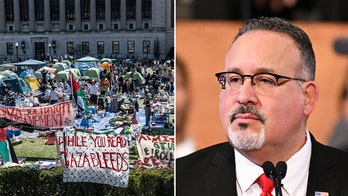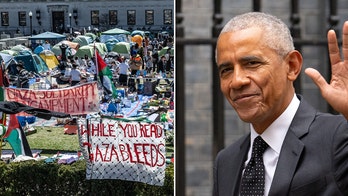
FILE: This Sept. 28, 2010, photo shows workers using ground moving equipment at a construction site in the Jewish settlement of Revava, near the West Bank city of Nablus. (AP)
President Obama has abandoned attempts to persuade Israel to slow West Bank settlement activity, officials said Tuesday, dealing a major blow to the resumption of Israeli-Palestinian peace talks and one of the president's top foreign policy initiatives.
After months of trying to broker a formula under which Israel would impose a new, temporary settlement freeze in return for U.S. promises and incentives, two American officials said the administration has concluded that course will not work. The decision was expected to be announced later Tuesday.
Talks stalled in September, barely a month after they started. The Palestinians refused to return to direct negotiations until a new freeze was in place after an earlier 10-month Israeli slowdown in settlement expansion expired.
Now, said the U.S. officials, American pressure for a three-month moratorium and the U.S. incentives package, which included political, diplomatic and security assurances for Israel, are off the table. They spoke on condition of anonymity because they were not authorized to speak publicly on the matter.
The White House's bid for a Middle East peace settlement was a long shot from the start, but its apparent breakdown comes at a time when the administration is struggling on a number of fronts abroad. There is slow progress in the Afghan war, increasing friction with China and the embarrassing deluge of confidential diplomatic cables released by the website WikiLeaks.
The U.S. officials said the administration was not giving up efforts to broker a peace deal and noted that Israeli and Palestinian negotiators will visit Washington next week for consultations.
The United States will be talking with both sides in the coming days, one of the officials said, while Arab states and other interested countries also will be consulted.
However, the administration's decision to drop support for the Palestinians' key demand could mean the end of the moribund peace process.
Obama had made Israeli-Palestinian peace a major goal of his administration, appointing seasoned peace negotiator George Mitchell as his special Mideast envoy on his second day in office.
Mitchell made dozens of trips to the region to get the parties to agree to direct talks. In early September, with the expiration of the initial slowdown looming, Obama brought Israeli Prime Minister Benjamin Netanyahu and Palestinian President Mahmoud Abbas along with the leaders of Jordan and Egypt to launch the face-to-face discussions, which failed.
Neither Israeli nor Palestinian officials would comment on the developments in Washington before their official announcement.
Earlier Tuesday, Israeli Defense Minister Ehud Barak said the United States had halted talks with Israel on settlement activity because Washington was distracted by the WikiLeaks release of secret documents.
State Department spokesman P.J. Crowley responded by saying that Israel may have been preoccupied with putting out a huge forest fire that burned until Sunday.
The U.S. had been pressing Israel to renew a moratorium on new settlement construction in exchange for security guarantees and diplomatic assurances of support. Israel wanted those in writing, as well as a pledge that east Jerusalem would be exempt from the moratorium.
The Palestinians refused to return to the peace talks unless Israel halted all building in the West Bank and east Jerusalem, lands the Palestinians want for part of their future state.
Peace talks began in September but ground to a halt three weeks later after Israel's original moratorium on new West Bank construction expired.
Netanyahu returned from a November trip to the U.S. with a list of guarantees, including 20 next-generation stealth fighter planes and U.S. pledges to veto anti-Israel resolutions at the United Nations, according to Israeli officials.
In exchange, Israel was asked to renew the expired limits on settlement construction.
Days later the deal snagged after members of Netanyahu's Cabinet demanded a written pledge from the U.S. that the moratorium would exclude east Jerusalem. Such a pledge never materialized.
The U.S. had wanted a moratorium in the hopes that it would allow Israel and the Palestinians to make enough progress in drawing their future borders to make the settlement question irrelevant.
With borders determined, Israel could resume building on any territories it would expect to keep under a final peace deal.
But Israeli officials said Tuesday that short of an understanding on borders, a crisis could erupt if Israel agreed to the freeze sought by the United States.
Now, said Israeli officials, insisting on anonymity because of the sensitivity of the contacts, the U.S. and Israel have agreed on a statement that "in the coming days and weeks, efforts will continue toward finding ways to renew the direct negotiations in order to reach a framework that would lead in the end to an agreement between the two sides."




